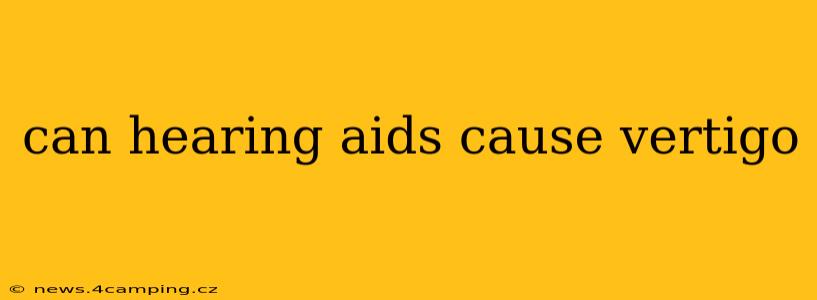Vertigo, that disconcerting sensation of spinning or the room spinning around you, can be a debilitating condition. While hearing aids significantly improve the quality of life for millions with hearing loss, some individuals report experiencing vertigo after starting hearing aid use. This raises a crucial question: can hearing aids actually cause vertigo? The short answer is: it's complex, and not a simple yes or no. While hearing aids themselves don't directly cause vertigo, certain factors related to their use can trigger or exacerbate existing vestibular issues.
How Can Hearing Aids Affect Balance and Vertigo?
The relationship between hearing aids and vertigo isn't a direct causal link but more of a circumstantial one. Several factors can contribute to the sensation of dizziness or vertigo in some hearing aid users:
-
Sudden Changes in Auditory Input: For individuals with significant hearing loss, the sudden influx of amplified sounds can overwhelm the brain, leading to temporary dizziness. This is particularly true in the initial adjustment period to wearing hearing aids. The brain needs time to adapt to the new level of auditory stimulation.
-
Ear Infections or Blockages: Improperly fitted hearing aids can trap moisture and debris in the ear canal, increasing the risk of ear infections. Ear infections can, in turn, impact the inner ear, the very organ responsible for balance, potentially leading to vertigo.
-
Pressure Changes in the Ear Canal: Some hearing aid styles, particularly those that create a tight seal in the ear canal, can temporarily alter ear pressure. Fluctuations in ear pressure are known to trigger feelings of dizziness in susceptible individuals.
-
Exacerbation of Pre-existing Conditions: People already suffering from vestibular disorders (inner ear problems affecting balance) might find that wearing hearing aids worsens their symptoms, although the hearing aids aren't the root cause. The amplified sounds can overload an already sensitive system.
-
Side Effects of Certain Hearing Aid Features: Some advanced hearing aid features, like noise reduction or directional microphones, might contribute to spatial disorientation in certain individuals, leading to a feeling of imbalance. This is less common but worth considering.
What Are the Symptoms of Vertigo Related to Hearing Aids?
The symptoms experienced can vary greatly from person to person but might include:
- Spinning sensation: The classic symptom of vertigo, feeling like you or your surroundings are spinning.
- Lightheadedness: A feeling of faintness or unsteadiness.
- Nausea and vomiting: Often accompanying vertigo, particularly if the sensation is severe.
- Loss of balance: Difficulty walking or maintaining equilibrium.
- Headache: Can occur alongside vertigo.
What Should I Do if My Hearing Aids Cause Vertigo?
If you experience dizziness or vertigo after starting to wear hearing aids, several steps can be taken:
- Consult your audiologist: This is the most crucial step. They can assess your situation, check for proper fitting, rule out ear infections, and adjust the hearing aid settings to minimize potential triggers.
- Gradual adjustment period: Your audiologist might recommend a gradual increase in wearing time to allow your brain to adapt to the new auditory input.
- Proper cleaning and maintenance: Keeping your hearing aids clean and dry is crucial to prevent ear infections.
- Medication: In some cases, your doctor might prescribe medication to alleviate vertigo symptoms.
Can I Still Use Hearing Aids If I Have Vertigo?
In most cases, yes. The key is proper fitting, adjustment, and ongoing monitoring by your audiologist. They can help identify whether the vertigo is genuinely related to the hearing aids or an unrelated condition. They can also explore alternative hearing aid styles or settings to minimize the risk of triggering vertigo.
Is it always a hearing aid causing the vertigo?
No. It's crucial to remember that vertigo has many potential causes, and hearing aids are only one possible factor. Other underlying medical conditions, such as inner ear infections, Meniere's disease, or benign paroxysmal positional vertigo (BPPV) can also cause vertigo. A proper medical evaluation is essential to determine the precise cause of your dizziness.
How can I prevent vertigo from hearing aids?
Prevention is key. Regular check-ups with your audiologist, proper hearing aid maintenance, and a gradual adjustment period to new hearing aids can all help minimize the risk of vertigo.
By understanding the potential relationship between hearing aids and vertigo and seeking professional guidance, individuals with hearing loss can maximize the benefits of hearing aids while minimizing any potential discomfort. Remember, it’s always best to consult your doctor or audiologist if you experience any concerning symptoms.
